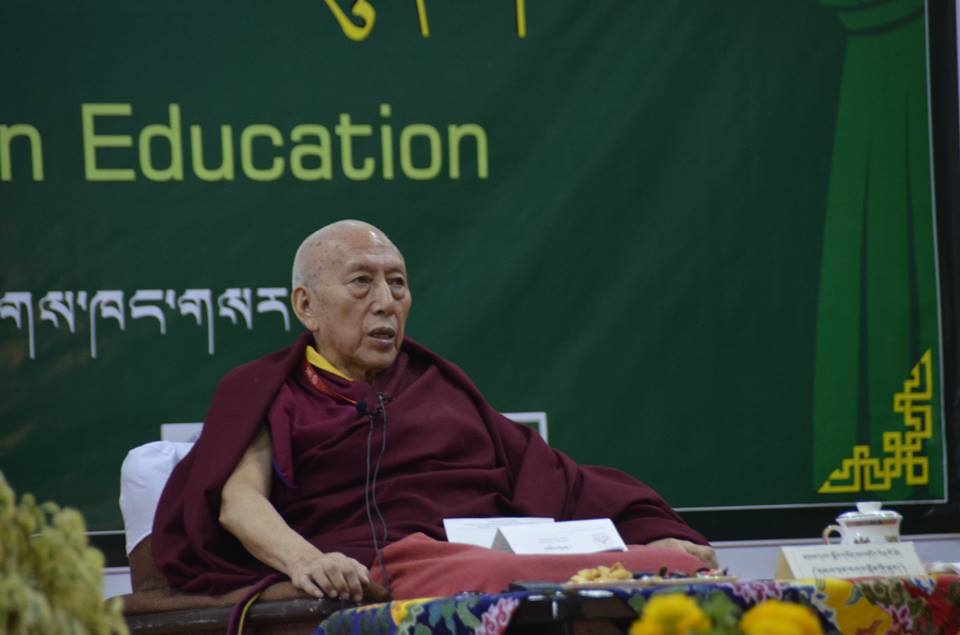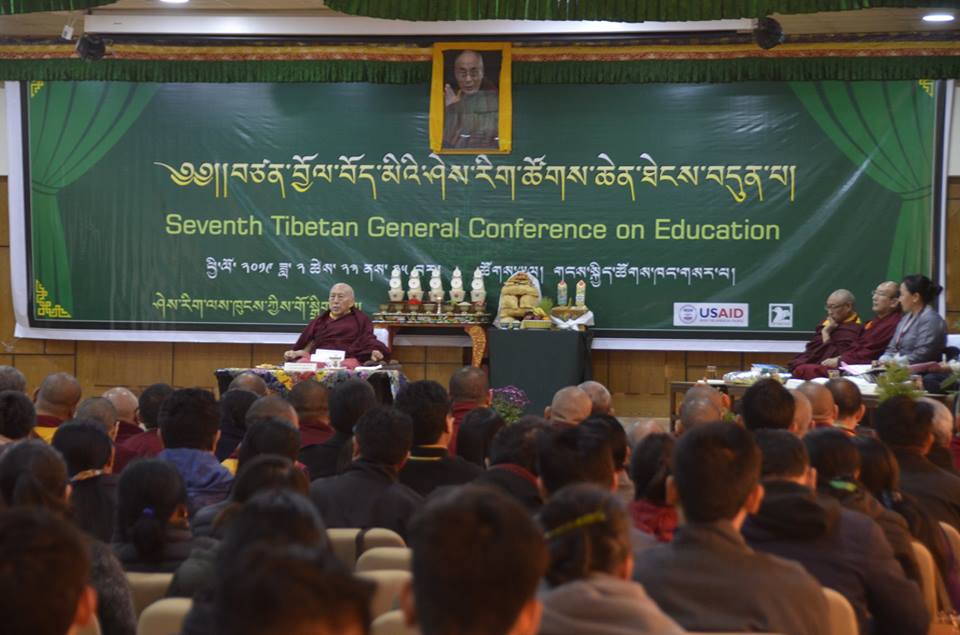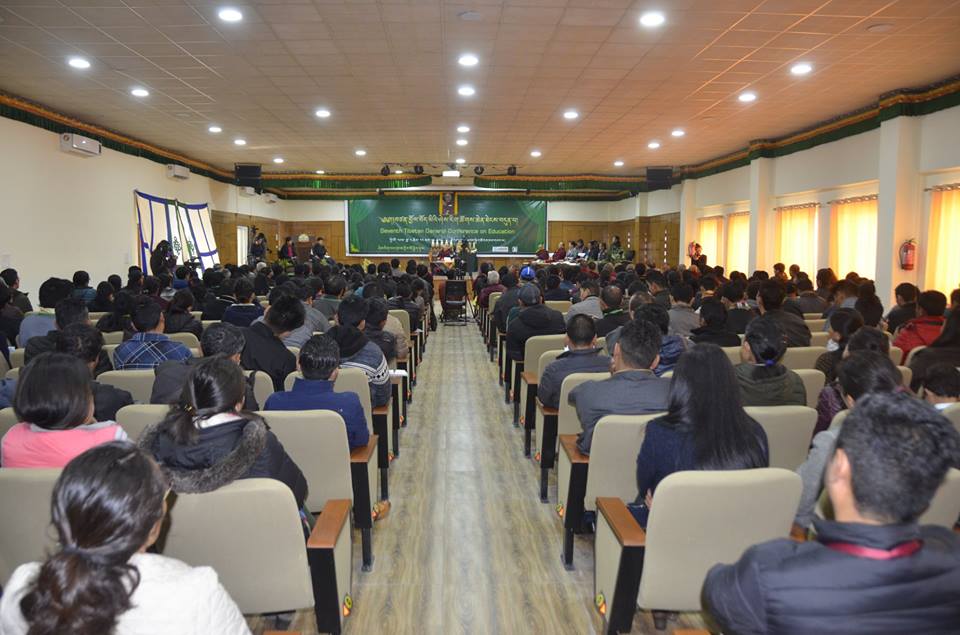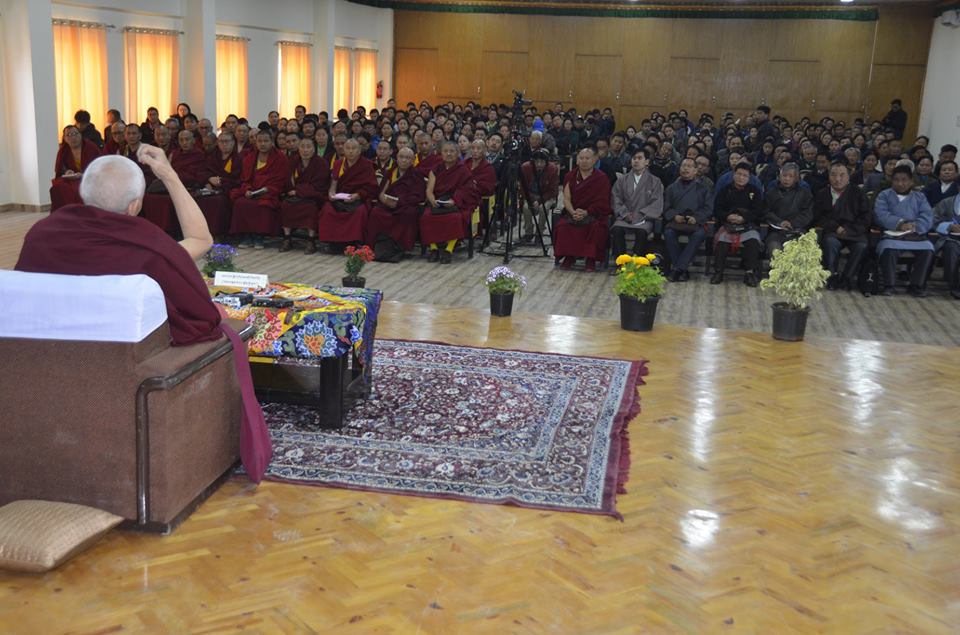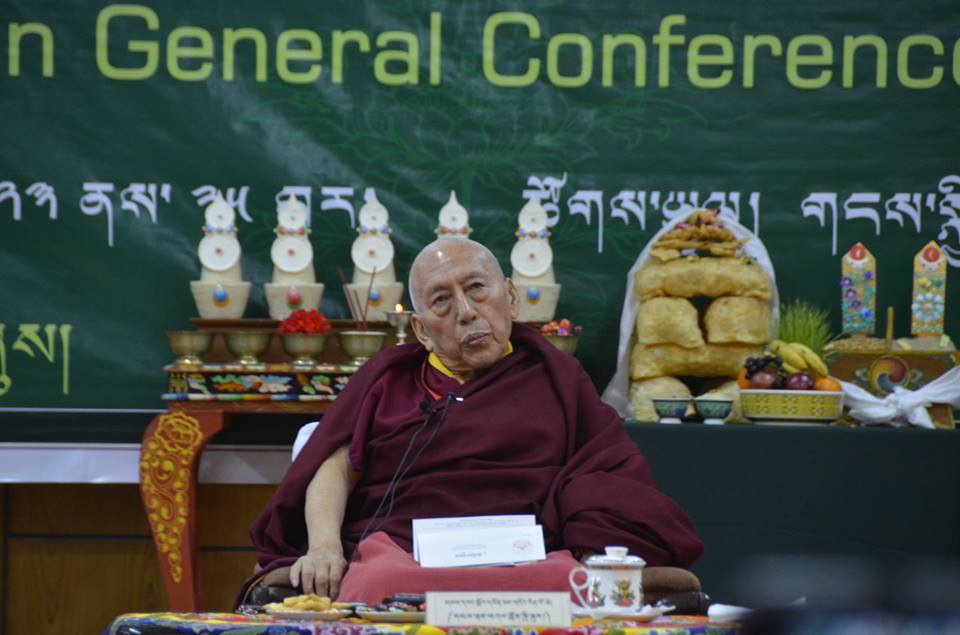Guidance speech at the Seventh General Conference on Education
At the request of Education Department, Central Tibetan Administration, Dharamshala, on 25 February 2019, His Eminence Prof. Samdhong Rinpoche gave a guidance speech, at the Seventh General Conference on Education, on the theme of “The reasons a teacher’s profession is distinct from other professions; and a teacher’s conduct, and the ways of carrying out the duties.” His Eminence Rinpoche also answered questions at the end.
Organised by the Education Department, CTA, the guidance speech was convened in the Conference Hall, Gangchen Kyishong, Dharamshala.
His Eminence Prof. Samdhong Rinpoche said: Most of you would know,that since recently I have been trying not to be involved in the Tibetan society and the Tibetan Administration, and not to give talks often.
At this General Conference there are many participants not just from India, rather from countries abroad, which is an indication of the progress in the works as regards education of the Tibetans.
When the first General Conference on Education was convened in the early 1960’s, there were only some 30 participants. This leap in the number of participants now is a situation to be joyful with the works done on education during the last 60years. That under the sublime leadership of His Holiness the Dalai Lama the works on education of the exile Tibetans have been distinct from others—efficient and of far-reaching results—is recognisable now after 60 years. Compared with the state of things in 1959, that we have been able to preserve and maintain our Tibetan spirituality and culture is significantly of a far-reaching achievement.
When looking at history of education in Tibet, it has been a thing to be marvelled about, for, compared with other countries and race of people on this earth, there has not been a race of people as Tibetans, with so many adepts emerged throughout the centuries. There has not been a single race of people who have produced so large number of writings as the Tibetans. Nor have there been any other nationalities who have translated so many literatures from other languages as the Tibetans.
For example, in the case of China, in terms of population they were many folds more than the Tibetans, and their contact with India and the subsequent translation of Buddha’s teachings into Chinese was much earlier. From around 200 CE, the translations of Buddha’s teachings into Chinese, from India, had already been started. At that time, Tibet did not have a formal linguistic framework of grammar and so on, nor a written script. The linguistic system came about after the seventh and eighth century. Yet, at present, if the texts of the teachings translated into Chinese language were to be compared with those translated into Tibetan language, there is nothing to compare at all, in terms of anything—be it the number of texts, be it the quality of the translations. On this earth, there is no other example as that of Tibet and Tibetans in terms of the sheer volume and quality of translations from other languages into one’s language. The indigenous Tibetan writings that have been lost are gone; nonetheless, those which are extant now are so many.
As regards history of literature in India, it is asserted that it began 7000 years ago; some say it began 5000 years ago. Tibetan literary history is only of over a 1000 years. During that period the efforts put by the kind Tibetan spiritual kings, lotsawa-translators, pandita-teachers are something as if beyond conceptuality. These days when we translate some pages of the teachings, we feel the enormous hard efforts put by the past lotsawa-translators and pandita-teachers. Our past history has been a marvellous and a splendid one.
On a teacher’s conduct and the ways of carrying out duties, His Eminence Rinpoche advised:
A teacher needs to teach students with kindness. It is the responsibility of a teacher to make students bereft of fear in studying, and to instil enthusiasm towards studies by students.
A synonym for the word ‘teacher’ is ‘total retainer’ (whole carer; parigrah), that is someone who can fulfil totally the physical, speech and mental needs of a student. Later, in Tibet, the title ‘yoṅsḥzin’ (yong zin; whole carer, parigrah), meaning Tutor, came to be used specifically for teachers of reincarnate lamas. If it is an ordinary monk, not a reincarnate lama, his teacher/s would be called gaegaen (dgergan; Elder in Spirituality), not as ‘yong zin’. When someone is being addressed as a ‘yong zin’ it connotes that the person has a reincarnate lama as a student. In general, the term ‘yong zin’ is applicable to all teachers.
On the profession of a teacher as distinct from other professions, His Eminence Rinpoche said:
For the last 60 years, the thought of His Holiness the Dalai Lama for the exile Tibetans to be educated in both ancient, traditional and the modern instructions, while preserving our language and culture, is a sublime guidance. In Tibet, the Chinese government has been planning to obliterate, in non-obvious ways, the Tibetan spirituality, culture and language. The Tibetans at home living under Chinese government control would not be able to challenge that. The challenge has to be done by exile Tibetan communities living in free countries. For the past 60 years, the efforts towards that from the part of the exile Tibetans have not been a disgraceful one. For the past 60 years, because the exile Tibetans in India, Nepal and Bhutan have been living together in communities, the exile community and schools have been able to remain sustainable.
Yet, the situation of a community living together and that of living scattered are different, so it is important for us to prepare for future situations. When mistakes are made in politics, production, and so on, the loss is only for that period, there would be no major loss. But when mistakes takes place in education, the entire life of a student suffers loss; for example, for one class, some 40 students’ lives are ruined. This is gravely dangerous. If mistakes occur in the working years of a teacher, many thousands of persons’ lives would be ruined.
His Eminence Rinpoche advised on other related matters as well. At the conclusion of the guidance talk, a participant asked whether what are His Eminence Rinpoche’s thoughts as regards the ways of providing external facilities for the exile Tibetan school teachers. His Eminence Rinpoche responded:
A teacher’s profession has to be made distinct from the part of the individual teacher, and has to be distinct from other professions. In terms of salary and facilities and so on, the profession has to be distinct. Take India as an example: In the administration personnel’s thinking they consider administration works as the most important over all other works, so the salary of a secretary of the central Indian government is more by 300 rupees than that of a Vice-chancellor of a university. To do so is for indicating the difference.
For a teacher to focus on social prestige and material facilities makes him/her not a person embodying compassion; to hold such a view of prestige and material gains makes the person not a qualified teacher. Yet, it is important from the part of an administration to think of teachers’ facilities, salary, and so on.
